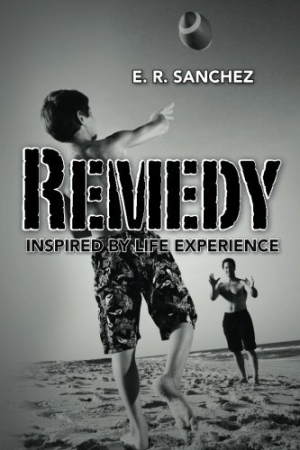
Remedy
Inspired by Life Experience
At turns humorous and heartbreaking, this novel follows one man’s search for the cure to all of life’s problems.
When a middle-aged California businessman realizes how tough the modern world is for him, he resorts to new, THC-influenced methods to gain revenue and renew his spirit in E. R. Sanchez’s Remedy.
Forty-year-old clothing manufacturer Phillip McCalister is down on his luck. He’s getting divorced, his business is failing, and his body is feeling the strain of the bad economy in his native San Fernando Valley. But an investigation into medical marijuana to relieve his physical pain gives him an idea of how to solve his money problems: start a grow-op. Putting all of his energy into a potentially risky venture, Phillip sets out to grow pot, reap the financial rewards, and bring about some greener pastures in his decaying life.
Remedy is a short narrative that deals with desperation, salvation, and the modern world at its most challenging. Apparently inspired by Sanchez’s own life experiences, Remedy leads the reader moment by moment through a harrowing experience that is as surprisingly exciting and humorous as it is dramatic and heartbreaking. As the title suggests, Phillip is looking for that cure for all of life’s problems, no matter how wild or difficult it might be to attain in this day and age, a relatable aspiration.
If the premise sounds a bit routine, like something from a TV or movie drama, Sanchez’s strong dialogue, details, and driving plot keep Remedy from becoming run-of-the-mill. Written in the present tense, readers accompany Phillip from the sterile, loveless residence and working place he occupies daily to his pleasant and funny experiences acquiring medical marijuana. Phillip’s discovery of such marijuana strain names as Trainwreck, Sour Diesel, Green Crack, and Maui Wowie and his clinic’s easygoing manner of giving him access to them offset his usual uptight demeanor as a white-collar business man. These details, coupled with the ones about his and his assistant Raul’s involvement in starting their own grow-op, add a humanistic and lightly comic edge to their normal business world, which is bleak, empty, and shallow.
The language throughout Remedy is interesting in an experimental way. The constant usage of present tense, such as when Phillip and Raul build their grow-op—“Raul walks toward the pile of 2x4s and begins to lay out the frame”—gives the story a fast pace, if overtly so. Raul’s street patois—“Yeah, good shit, huh. Fucking some Emergency Room OG Kush,” seems a bit contrived and, while probably written to be so, does not come across as truly authentic.
Yet Remedy is a powerful short novel. It presents real human characters and works to show their struggles in today’s world. It’s clearly written from the heart and deserves to be read by those that want some reality in their fiction.
Reviewed by
James Burt
Disclosure: This article is not an endorsement, but a review. The publisher of this book provided free copies of the book and paid a small fee to have their book reviewed by a professional reviewer. Foreword Reviews and Clarion Reviews make no guarantee that the publisher will receive a positive review. Foreword Magazine, Inc. is disclosing this in accordance with the Federal Trade Commission’s 16 CFR, Part 255.

